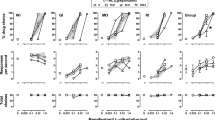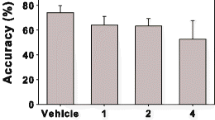Abstract
Rationale: Recent studies in animals have implicated endogenous cannabinoids in the regulation of palatable food intake, but it is not yet clear to what extent pharmacological agents acting on this system may have sustained actions and applicability to different feeding protocols. Objectives: In the present study, we examine the effects of the cannabinoid CB1 receptor antagonist SR 141716 on food intake of rats, and its behavioral specificity. We examine whether tolerance develops to the anorectic actions of SR 141716, and whether it has either additive or synergistic actions with dexfenfluramine or naloxone. Methods: Undeprived rats were trained to eat a daily sweet milk dessert and on test days were administered single or combination drugs and intakes were recorded. In other studies, rats were deprived for 24 h of either food or water and intakes recorded after drug administration at the end of this time. In one study, rats were fed ad libitum chow with SR 141716 added. Results: SR 141716 (1–3 mg/kg) suppressed both palatable food intake in undeprived rats and food, but not water, intake after deprivation. Using an isobolographic analysis, SR 141716 had an additive anorectic effect with dexfenfluramine. In contrast, SR 141716 in combination with naloxone had a significantly supra-additive anorectic action. SR 141716 was also effective orally and no tolerance to its anorectic effect developed over 3 days. Conclusions: These data show that SR 141716 is an effective anorectic agent using both palatable foods and bland chow, and is selective because water intake was unaffected. SR 141716 is also effective orally and has an effect sustained for at least several days. There appears to be a synergistic interaction between opioid and cannabinoid systems in the regulation of feeding, whereas the combination of a serotonin releasing agent and the CB1 antagonist is additive.
Similar content being viewed by others
Author information
Authors and Affiliations
Additional information
Electronic Publication
Rights and permissions
About this article
Cite this article
Rowland, N.E., Mukherjee, M. & Robertson, K. Effects of the cannabinoid receptor antagonist SR 141716, alone and in combination with dexfenfluramine or naloxone, on food intake in rats. Psychopharmacology 159, 111–116 (2001). https://doi.org/10.1007/s002130100910
Received:
Accepted:
Published:
Issue Date:
DOI: https://doi.org/10.1007/s002130100910




